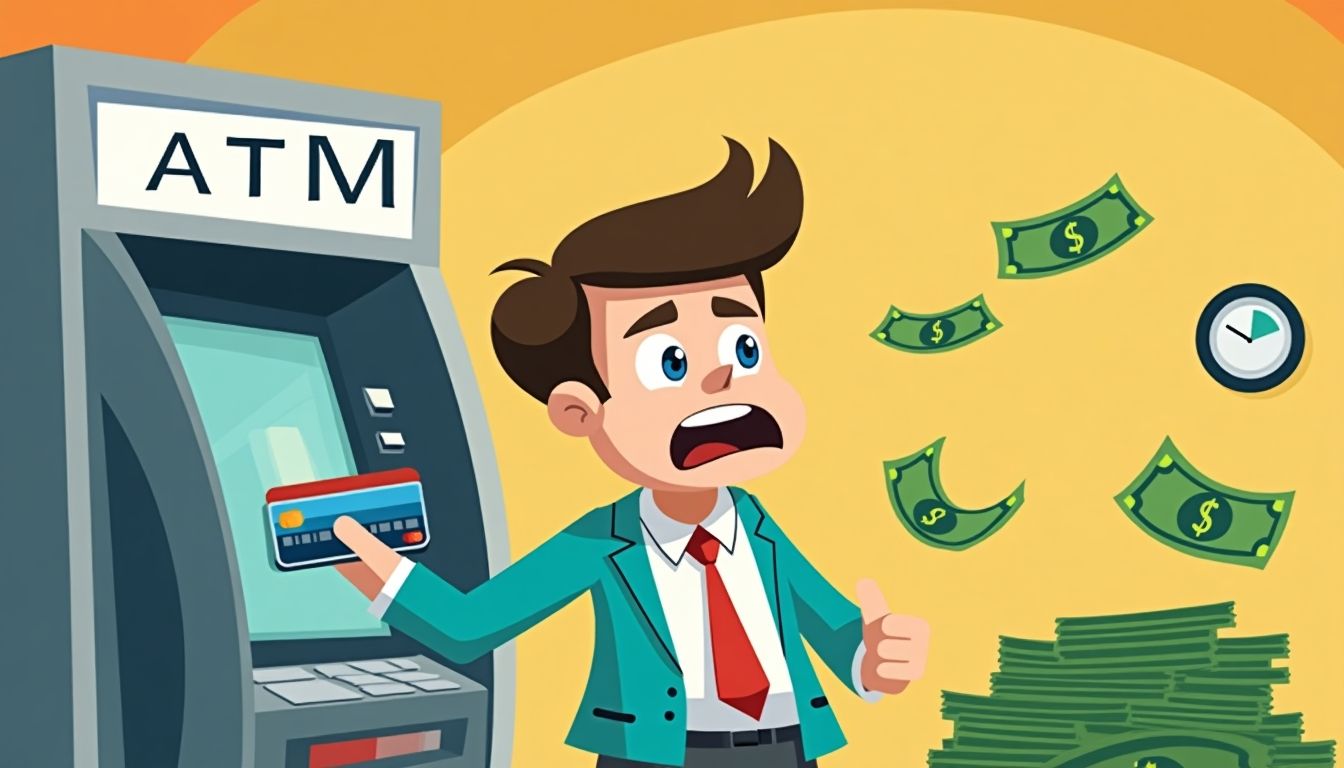Using a credit card for a cash advance can be a quick solution in times of financial need, but it’s important to navigate this option wisely. Here are five essential tips to help you manage cash advances effectively and minimize the associated costs.
Key Takeaways
- Use a cash advance only for emergencies to avoid unnecessary debt.
- Plan how you will repay the advance to minimize interest costs.
- Keep track of your credit card statements to monitor fees and interest charges.
- Limit the amount you withdraw to only what you truly need.
- Understand the fees and interest rates associated with cash advances.
- Avoid using cash advances for everyday expenses; save them for urgent situations.
- Consider alternatives like personal loans or emergency savings before opting for a cash advance.
- Be aware that cash advances can impact your credit utilization ratio, affecting your credit score.
1. Cash Flow Management
Managing cash flow is essential when using a credit card for a cash advance. Understanding your financial needs can help you avoid unnecessary debt. Here are some tips to keep in mind:
- Only Withdraw What You Need: Taking out only the amount necessary for your immediate expenses can help limit fees and interest. This way, you can manage repayments more easily.
- Plan for Repayment: Before you take a cash advance, have a clear plan for how and when you will pay it back. Setting aside a budget for repayments can keep you on track.
- Avoid Frequent Cash Advances: Relying on cash advances can lead to financial strain. Instead, consider building an emergency fund to cover unexpected expenses.
Cost Type | Details |
Cash Advance Fees | Typically 3% to 5% of the amount withdrawn. |
Higher Interest Rates | Cash advances usually have higher rates than regular purchases. |
No Grace Period | Interest starts accruing immediately. |
Managing cash flow effectively is crucial for maintaining financial health. By being mindful of your cash advances, you can avoid falling into a cycle of debt.
Monitoring your credit card statements regularly can also help you keep track of your cash advances and their associated costs. This awareness is key to maintaining a healthy credit utilization ratio, which should ideally stay below 30%.
2. Emergency Expenses
When unexpected costs arise, using a credit card for a cash advance can be a quick solution. This option provides immediate access to funds when you need them most. However, it’s essential to understand when and how to use this option wisely.
Situations to Consider a Cash Advance
- Medical Emergencies: Sudden medical bills can be overwhelming. A cash advance can help cover these costs quickly.
- Car Repairs: If your vehicle breaks down unexpectedly, a cash advance can help you get back on the road without delay.
- Travel Needs: Sometimes, you may need cash for tips or local purchases while traveling, and a cash advance can be handy.
Alternatives to Cash Advances
Before opting for a cash advance, consider these alternatives:
- Emergency Savings: If you have savings set aside, use them to avoid high-interest debt.
- Payment Plans: Ask service providers if they offer payment plans to spread out costs over time.
- Personal Loans: These often have lower interest rates than cash advances, making them a better option for larger expenses.
Using a cash advance should be a last resort. Always explore other options first to avoid high fees and interest rates.
Key Takeaways
- Cash advances can be useful for urgent expenses but come with high costs.
- Always have a plan to repay the amount quickly to minimize interest.
- Consider building an emergency fund to avoid relying on cash advances in the future.
In summary, while cash advances can provide quick relief during emergencies, understanding their costs and having a repayment strategy is crucial to maintaining your financial health. Remember, using a cash advance for non-emergencies can lead to a cycle of debt.
Be mindful of your financial choices and always look for alternatives before resorting to a cash advance.
3. Repayment Strategy
When you take a cash advance, having a solid repayment plan is essential. Paying off your cash advance quickly can save you a lot of money in interest. Here are some tips to help you manage your repayment effectively:
1. Set a Clear Repayment Timeline
- Decide how long you will take to repay the cash advance.
- Aim to pay it back in days instead of weeks to minimize interest costs.
- Create a budget that includes your repayment amount.
2. Make Regular Payments
- Try to make payments as soon as possible.
- Set up automatic payments if your bank allows it, to avoid missing due dates.
- Consider paying more than the minimum amount to reduce your balance faster.
3. Monitor Your Spending
- Keep track of your expenses to ensure you have enough funds for repayment.
- Avoid using your credit card for unnecessary purchases while repaying the advance.
- Check your credit card statements regularly to stay informed about your balance and interest charges.
A good repayment strategy not only helps you avoid high interest but also keeps your credit score healthy.
By following these steps, you can effectively manage your cash advance repayment and minimize the financial burden it may cause. Remember, the sooner you repay, the less interest you will pay overall, making it easier to maintain your financial health.
4. Credit Utilization
When you take a cash advance, it counts against your credit limit, which can raise your utilization ratio. Keeping this ratio low is important for your credit score. Ideally, you should aim to keep your credit utilization below 30%. For example, if your credit limit is $10,000, try to keep your balance under $3,000.
Why It Matters
- A high utilization ratio can signal to lenders that you might be overextended.
- This can lead to a lower credit score, making it harder to get loans in the future.
- Late payments on cash advances can also negatively impact your credit report.
Tips to Manage Credit Utilization
- Only take what you need: Withdraw only the amount necessary for your immediate needs to limit fees and interest.
- Have a repayment plan: Know how and when you will pay back the cash advance to avoid high interest.
- Monitor your statements: Keep an eye on your credit card statements to track your cash advance and interest charges.
Managing your credit utilization wisely can help protect your credit score and financial health.
Summary of Key Points
Aspect | Recommendation |
Utilization Ratio | Keep below 30% |
Repayment Strategy | Plan ahead to avoid high interest |
Monitoring | Regularly check your statements |
By following these tips, you can use cash advances responsibly while maintaining a healthy credit profile.
5. Interest Rates
Understanding Interest Rates
When using a credit card for a cash advance, it’s crucial to understand how interest rates work. Cash advances often come with higher rates than regular purchases. This means you could end up paying more in the long run.
Comparing Rates
Here’s a quick comparison of typical interest rates for cash advances versus regular purchases:
Type of Transaction | Average Interest Rate |
Cash Advance | 24% - 30% |
Regular Purchase | 13% - 20% |
- Higher Rates: Cash advances usually have higher interest rates than regular purchases.
- No Grace Period: Unlike regular purchases, cash advances often start accruing interest immediately.
- Fees: There may be additional fees for cash advances, which can increase your total cost.
Understanding the interest rates associated with cash advances is essential for managing your finances wisely. Always read the terms and conditions before proceeding.
Conclusion
In summary, being aware of the interest rates and fees associated with cash advances can help you make informed decisions. Always consider your repayment strategy to avoid high costs.
Final Thoughts on Cash Advances
Using a credit card for a cash advance can be helpful in tough times, but it’s important to be careful. Always take only what you need and plan how you will pay it back. Keep an eye on your credit card statements to avoid surprises. Remember, cash advances can lead to high fees and interest, so think about other options first. If you must use one, make sure you understand the costs involved. By following these tips, you can use cash advances wisely and keep your finances in check.
Frequently Asked Questions
What is a cash advance on a credit card?
A cash advance is when you borrow money from your credit card, usually through an ATM or bank. It’s a quick way to get cash but can be expensive.
How do I get a cash advance?
You can get a cash advance by using your credit card at an ATM or bank. You might also have checks from your card issuer that you can use.
Are there fees for cash advances?
Yes, there are usually fees for cash advances. These can be a flat fee or a percentage of the amount you withdraw.
When does interest start on a cash advance?
Interest on a cash advance starts right away, unlike regular purchases that may have a grace period.
What’s the difference between a cash advance and a regular purchase?
A cash advance gives you cash immediately and starts accruing interest immediately. A regular purchase may have a grace period before interest starts.
Can cash advances affect my credit score?
Yes, cash advances can affect your credit score since they increase your credit utilization ratio.
Is there a limit to how much I can withdraw as a cash advance?
Yes, the cash advance limit is usually a percentage of your total credit limit.
How can I repay a cash advance?
You can repay a cash advance like any other credit card charge. Make sure to pay it back as soon as possible to avoid high interest.
What should I do if I can’t repay my cash advance?
If you can’t repay your cash advance, contact your card issuer to discuss options. It’s important to address it quickly to avoid more fees.
Are cash advances a good idea?
Cash advances can be useful in emergencies but are often costly. It’s best to explore other options first.
What are some alternatives to cash advances?
Alternatives include using savings, getting a personal loan, or borrowing from friends or family.
Can I take out a cash advance while traveling?
Yes, you can take out a cash advance while traveling, but be aware of any foreign transaction fees.









